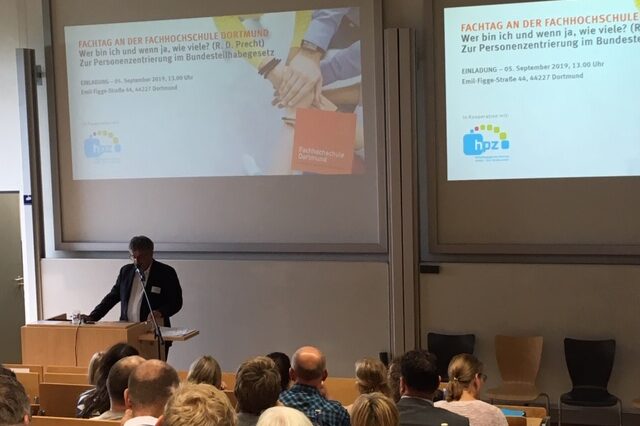
Symposium: Who am I and if so, how many? (R. D. Precht) - On person-centeredness in the Federal Participation Act
The symposium "Person-centeredness in the Federal Participation Act" at Fachhochschule Dortmund on 5 September 2019 was fully booked with more than 150 participants, just like last year. The organizers Prof. Dr. Michael Boecker (Fachhochschule Dortmund) and Dr. Michael Weber (HPZ-Krefeld) were once again more than satisfied. The event was opened by Prof. Dr. Ahmet Toprak (Dean of the Faculty of Applied Social Studies).
The main focus of the symposium was the discussion of the person-centered approach required by the Federal Participation Act (BTHG) and its effects on the participation situation of people with disabilities. Prof. Dr. Michael Boecker and Dr. Michael Weber from the Heilpädagogisches Zentrum in Krefeld were invited to the Fachhochschule Dortmund for this purpose.
Although the topic of person-centeredness was prominently anchored in the legal text with the adoption of the Federal Participation Act at the beginning of 2017, the resulting consequences in the field of integration assistance are not clear. In addition to the scientific-theoretical examination of the possibilities and limitations of person-centered approaches, the opportunities and risks of this development were discussed critically and controversially.
An ambiguous term
It was therefore not surprising that, in addition to researchers, numerous stakeholders from the NRW welfare sector and representatives of the regional associations and self-help organizations took part in this symposium. The input from the speakers in the plenary session and during the panel discussion in the afternoon made it clear how complex and multifaceted the concept of person-centeredness is to discuss.
However, it also became clear that the focus on the individual must not lead to the structural and social framework conditions for the participation of people with disabilities being overlooked. The complexity of this discourse is also reflected in the various contributions from the speakers.
Prof. Boecker spoke about the opportunities and risks of de-institutionalization and person-centredness for social work. Janina Bessenich outlined the legal consequences for people with disabilities and for service providers.
Neoliberal myths
Prof. Dr. Bernd Halfar took a critical stance on the possibilities of person-centered financing of workshops before Dr. Dieter Schartmann, representing the Rhineland Regional Association, presented his comments from the perspective of a service provider. The significance of neoliberal myths for the approach of neoliberal assistance by Prof. Dr. Johannes Schädler concluded the plenary presentations.
During the panel discussion, the transition of people with disabilities from the workshop to the primary labor market was critically discussed. In addition to the speakers already mentioned, Stefan Kohorst, Managing Partner of Dr. Ausbüttel & Co. GmbH, shared his personal experiences of integrating people with disabilities into a medium-sized family business.
At the end of the symposium, it became clear that in addition to a large number of structural changes and measures for person-centeredness, the attitudes and intentions of the individual players are decisive for the participation of people with disabilities in the Federal Republic of Germany.
